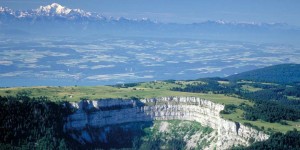Triglav Gathering Discusses a Place for Nature in Environmental Politics
The meeting in Neuchatel, Switzerland, 14-15 June 2014, was organized by the Triglav Circle, a Non-Governmental Organization with Special Consultative Status with the United Nations. It addressed the philosophical, moral, and spiritual dimensions of the subject of Nature as well as the politics concerning Nature carried on today in political institutions and those of the world economy.
The final report of this meeting will cover the specific topics addressed at the meeting. These included: Theoretical questions Approaching Nature as being alive, unfolding and diversifying since more than 5 million years, the experience of which is an essential source of inspiration for a harmonious and lasting civilization.
- The place of Nature in politics and political philosophy today and the roles that philosophy and religion could play in moving the world towards a less Promethean approach to Nature.
- The theoretical basis and the practical value of a ‘holistic’ approach to sustainable development as advocated by the UN and which should engender a more inclusive and positive merging of different sources of knowledge to address “environmental” issues.
- Promotion of the knowledge of nature and protection of it, embodied in traditional cultures – the “indigenous peoples”- as more than a curiosity for specialists.
- Imagining a new form of international or global organization to work on a more harmonious relationship between Man and Nature.
Relevant Institutional Questions
- The history of the development of international laws in respect of Nature.
- Reasons that can be offered for the persistent inadequacy of international efforts to address the continuing deterioration of major aspects of the human “environment” including the gap between successful local/regional efforts and achievements and their failure to translate to the national and global levels.
- The advantages and drawbacks of the political and institutional associations between ‘development’ and the ‘environment.’
- Enhancing the roles and representation of non-governmental organizations and other forms of social movements in national and international policy-making settings in particular, because these NGO’s have always been at the forefront of the struggle for the protection of the environment.
- http://youtu.be/Ej0GVMQuYbU Click on the blue link to view video
Papers were prepared by most of the attendees on specific topics of the meeting. The attendees were all public intellectuals, academics and/or scholars and researchers of related subjects. A recent college graduate and major in environmental studies, Blanda Anita, served as the rapporteur.
The participants included Philippe Roch – former Secretary of State for the Environment in Switzerland, as well as former Director of WWF Suisse; participant in all the major UN World Conferences on the Environment, scholar and author of writer of books on philosophy, spirituality and nature; Eduard Dommen – Professor of economics and development, University of Geneva, former UNCTAD Director, leading scholar on the economic theory of John Calvin, president of the Scientific Committee of the Geneva Academic Network, and active Quaker in Geneva, Switzerland; Arthur Lyon Dahl – Biologist,[expert in marine biology], environmental consultant to intergovernmental organizations, president of the International Environmental Forum, leading member of the Baha’i movement, and coordinator of System-wide Earth Watch, Geneva; Jean Michel Collette – scholar, linguist, researcher, former UN officer engaged in economic, trade and environmental issues and author of numerous books on social and economic history in various parts of the world; Oliver Smith – Deputy Director of WWF in the UK, founder and leader of a number of international environmental NGO’s, environmental adviser in China, scholar and author; Peter Baas – Administrator of Triglav Europe, international consultant and adviser to governments and non-government institutions on human resources, management and finance. http://youtu.be/0Kgs1GTnazM Click on the blue link to view video.
Barbara Baudot – Coordinator of the Circle, Professor of Politics, International Relations, and Environmental Studies, former Economics Officer in the UN, author, panelist for the Fourth Interactive Dialogue on Harmony with Nature held by the UN General Assembly, 22 April 2014; Jacques Baudot – Secretary of the Circle, formerly Director of the Division on Social Development in the United Nations, having served also as Director of the Budget, Acting Controller, and Coordinator of the World Social Summit, Copenhagen, 1995; and J. Dirck Stryker – Treasurer of the Circle, Professor Emeritus, Fletcher School of Law and Diplomacy, Founder and Director of Associates for International Research and Development [AIRD], international consultant on rural development and agricultural policies in developing countries.
The gathering took place in the Conference Center of the Hotel L’Aubier, which is situated on the premises of 100+ acre bio-dynamic farm, an appropriate location given that the meeting focused on the role of nature in the politics of the environment. One of the key events at the meeting was a lecture and a tour of this farm by its owner Ueli Hurter, a member of the executive board of the International Biodynamic Association.[1] http://youtu.be/psWQQC8PcjU Click on the blue link to view video. The lecture covered the philosophy underlying biodynamic farming, as well as its related practices, which are clearly examples of how to work in “harmony with nature” in a healthy and highly productive way for the combined benefit of humankind, the soil, and nature in general.[2] https://www.youtube.com/watch?v=X9Ph4bGRtpk&feature=player_embedded Click on the blue link to view video.
[1] Ueli Hurter is editor of the book Agriculture for the Future: Biodynamic Agriculture Today, published by the sector for agriculture of the Goetheanum, Dornach, Switzerland. He is a leader of the initiative Zukunft
Saen! [Sowing the Future] www.avenirsem.ch. He is past president of the Swiss Demeter association and presently a joint leader of the Section for Agriculture of the Goetheanum.
[2] Biodynamic farming has been at the origins of the Community Supported Agricultural [CSA] movement in the US. The Temple-Wilton CSA, in Wilton, NH was one of the two first CSA farms established in the US, today there are over 2000 CS farms in the US. Many of these farms are biodynamic or organic.

